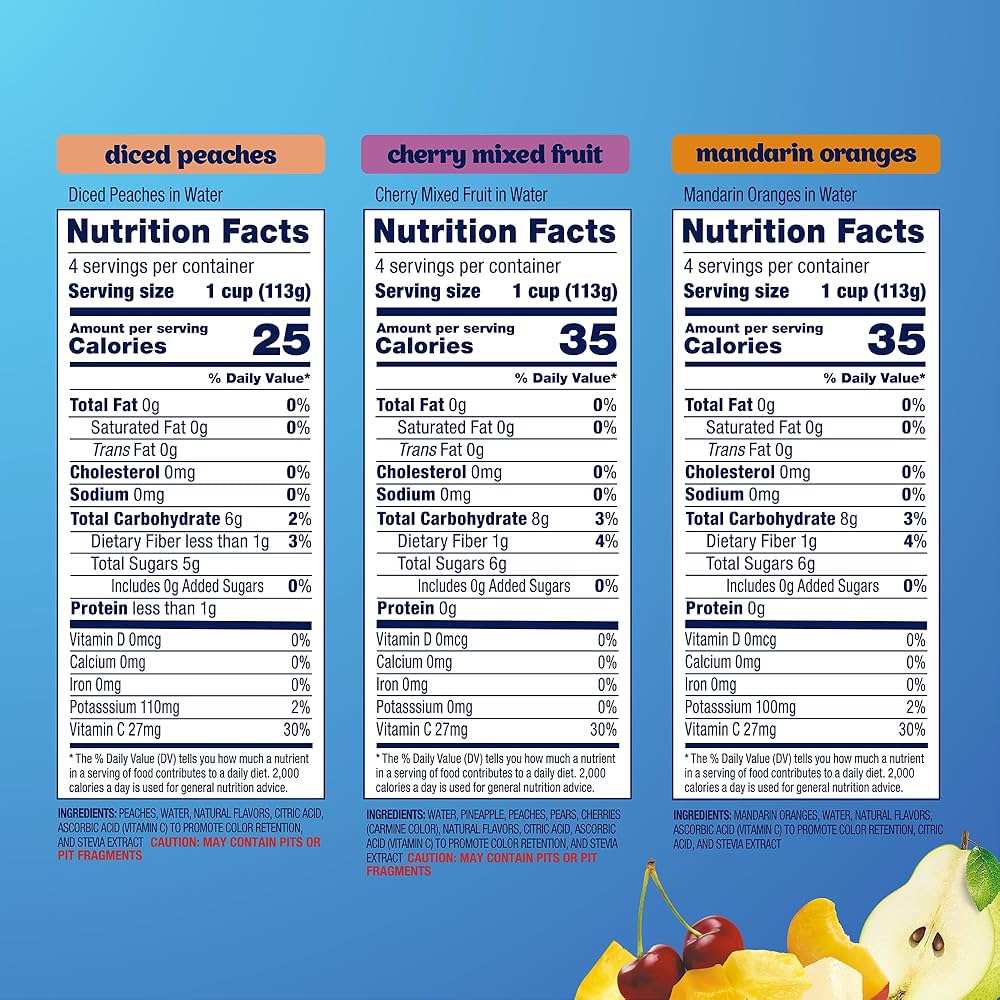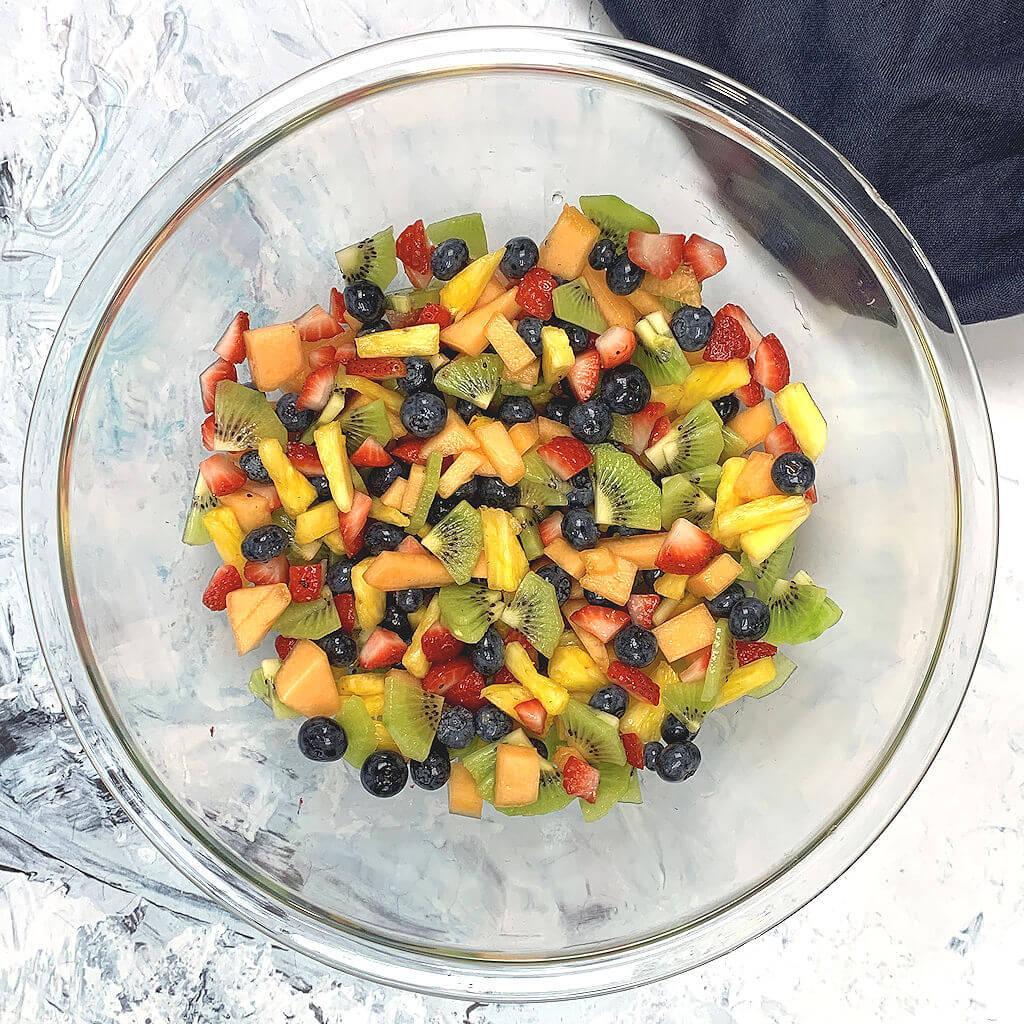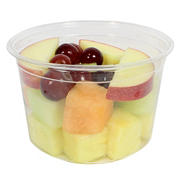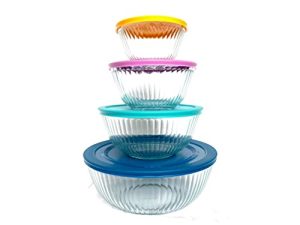Are you curious about how many calories are in a small bowl of mixed fruit? Knowing this can help you make smarter choices for your health and diet.
Whether you’re watching your weight, managing your energy, or just want to enjoy fruit without guilt, understanding the calorie count is key. You’ll discover the calorie details of popular fruits in your bowl and simple tips to enjoy them guilt-free.
Keep reading to learn how this tasty snack fits into your daily nutrition.

Credit: www.amazon.com
Calorie Basics In Mixed Fruit
A small bowl of mixed fruit is a healthy snack choice. Fruits contain natural sugars and fiber. These contribute to the calorie count.
The calories in mixed fruit depend on the types and amounts of fruit used. Each fruit has its own calorie content. Knowing this helps control your calorie intake.
Common Fruits In A Small Bowl
Small bowls often contain popular fruits like apples, bananas, berries, and grapes. These fruits are easy to prepare and tasty. They provide a mix of vitamins and minerals.
Other fruits may include oranges, pineapple, and melon. Each fruit adds a different flavor and texture. The mix makes the bowl more enjoyable to eat.
- Apples
- Bananas
- Strawberries
- Blueberries
- Grapes
- Oranges
- Pineapple
- Melon
Calorie Range Per Fruit Type
Each fruit has a different calorie amount per serving. For example, berries are low in calories. Bananas and grapes have more calories.
| Fruit | Calories per 100g |
|---|---|
| Apple | 52 |
| Banana | 89 |
| Strawberries | 32 |
| Blueberries | 57 |
| Grapes | 69 |
| Orange | 47 |
| Pineapple | 50 |
| Melon | 34 |
Knowing these numbers helps you estimate the calories in your fruit bowl. A small bowl usually has about 150 to 200 calories. This depends on the mix and portion sizes.
Factors Affecting Calorie Count
The calorie count in a small bowl of mixed fruit can change a lot. Different things affect how many calories you get.
Knowing these factors helps you understand what you eat better. It can guide you to make healthier choices.
Portion Size Variations
The size of your fruit bowl changes the calories. A bigger bowl has more fruit and more calories.
Even small changes in amount can add or cut calories significantly.
- A small bowl usually holds about 1 cup of mixed fruit.
- Half a cup has roughly half the calories.
- A large bowl may have 2 cups or more.
Ripeness And Sugar Content
Riper fruits often have more sugar. More sugar means more calories in the fruit.
Fruits like bananas and mangoes get sweeter as they ripen, increasing calorie content.
- Unripe fruit has less sugar and fewer calories.
- Overripe fruit may have extra natural sugars.
- Different fruits vary in natural sugar levels.
Added Ingredients
Sometimes, people add extras like syrup, honey, or yogurt. These ingredients add calories to the fruit bowl.
Even small amounts of added sugar or cream can raise the calorie count a lot.
- Syrup or honey adds simple sugars and calories.
- Yogurt or cream adds fats and proteins.
- Nuts or seeds add calories from healthy fats.
Estimating Calories Accurately
Knowing the calories in a small bowl of mixed fruit helps with healthy eating. Fruit calories can vary a lot depending on the types and amounts.
To estimate calories well, you need to check the fruit types and measure the portions carefully. This guide shows easy ways to do that.
Using Nutrition Labels
Nutrition labels give calorie information for packaged fruits. Check the serving size and calories per serving on the label.
If your mixed fruit includes canned or pre-packaged items, use the label to find calories. Add the calories from each fruit type to get the total.
- Look for serving size on the package
- Note calories per serving
- Multiply by how many servings you eat
- Add calories for all fruit types in the bowl
Weighing And Measuring Portions
Weighing fruit is a good way to get exact calorie counts. Use a kitchen scale to measure the fruit in grams or ounces.
Measuring cups also work for loose fruits like berries or chopped pieces. Compare the weight or volume with calorie charts for each fruit.
| Fruit | Calories per 100g | Calories per 1 cup |
|---|---|---|
| Apple | 52 | 65 |
| Banana | 89 | 121 |
| Strawberries | 32 | 49 |
| Grapes | 69 | 104 |

Credit: www.agourmetfoodblog.com
Health Benefits Beyond Calories
A small bowl of mixed fruit offers more than just calories. It provides important nutrients that help your body stay healthy.
Eating mixed fruit can improve digestion, support your immune system, and give you natural energy. Let’s look at the key benefits.
Vitamins And Minerals
Mixed fruit contains many vitamins and minerals. These help your body grow and repair itself every day.
- Vitamin C boosts your immune system and skin health.
- Potassium helps control blood pressure and heart function.
- Folate supports cell growth and brain health.
- Vitamin A improves vision and immune defense.
Fiber And Satiety
Fiber in mixed fruit helps your digestion and keeps you full longer. It slows down sugar absorption and helps control hunger.
| Type of Fiber | Benefit |
| Soluble Fiber | Helps lower cholesterol and controls blood sugar. |
| Insoluble Fiber | Keeps your digestive system moving smoothly. |
Natural Sugars Vs. Processed Sugars
Mixed fruit contains natural sugars, which your body uses for energy. These sugars come with vitamins, minerals, and fiber.
Processed sugars, like those in candies and sodas, offer calories but no nutrients. They can cause energy crashes and health problems.
- Natural sugars are found in whole fruits.
- Processed sugars are added to many packaged foods.
- Eating natural sugars with fiber slows sugar absorption.
- Processed sugars can lead to weight gain and tooth decay.
Tips For Low-calorie Fruit Bowls
Eating a small bowl of mixed fruit is a healthy snack choice. You can keep it low in calories by picking the right fruits and ingredients.
This guide helps you make tasty fruit bowls that fit your calorie goals.
Choosing Low-calorie Fruits
Select fruits that have fewer calories but still taste sweet and fresh. Berries, melons, and citrus fruits are good options.
- Strawberries
- Blueberries
- Watermelon
- Cantaloupe
- Oranges
- Grapefruit
- Kiwi
Avoiding High-calorie Additions
Some toppings can add many calories to your fruit bowl. Skip sugary syrups, whipped cream, and heavy dressings.
| Addition | Calories per 2 tbsp |
| Honey | 128 |
| Chocolate syrup | 100 |
| Whipped cream | 52 |
| Granola | 100 |
| Yogurt (full fat) | 59 |
Incorporating Protein And Healthy Fats
Add small amounts of protein or healthy fats to keep you full longer. Nuts, seeds, and low-fat yogurt are great choices.
- Chopped almonds or walnuts
- Chia seeds or flaxseeds
- Low-fat Greek yogurt
- Cottage cheese
- Natural peanut butter (small amount)
:format(jpg)/d2lnr5mha7bycj.cloudfront.net/product-image/file/large_fd70dc1f-2ed4-4bef-93f5-7ac590fd402b.jpg)
Credit: shopnow.stewleonards.com
Frequently Asked Questions
How Many Calories Are In A Small Bowl Of Mixed Fruit?
A small bowl of mixed fruit typically contains around 70 to 100 calories. The exact amount varies based on fruit types and portions. Fruits like berries, apples, and melons are low in calories and high in nutrients.
Does Fruit Type Affect Calorie Count In Mixed Bowls?
Yes, fruit types significantly influence calorie counts. High-sugar fruits like bananas and grapes raise calories more than low-sugar fruits like watermelon or strawberries. Mixing a variety ensures balanced calories and nutrients.
Can Mixed Fruit Bowls Help With Weight Management?
Mixed fruit bowls are low in calories and high in fiber, aiding weight management. They provide essential vitamins and keep you full longer, reducing unhealthy snack cravings. Portion control is key for calorie balance.
Are Calories In Fresh And Canned Mixed Fruit Different?
Fresh mixed fruits generally have fewer calories than canned ones. Canned fruits often contain added sugars or syrups, increasing calorie content. Always check labels for added sugars in canned fruit products.
Conclusion
A small bowl of mixed fruit usually has around 50 to 100 calories. This depends on the types of fruits included. Fruits give you vitamins, fiber, and natural sweetness. They make a healthy, low-calorie snack option. Eating mixed fruit can help keep you full longer.
Choose fresh and colorful fruit for the best mix. Keep portion size in mind to manage calorie intake. Fruit bowls fit well in balanced diets and healthy lifestyles. Simple, tasty, and good for your body. A smart choice for any time of day.




